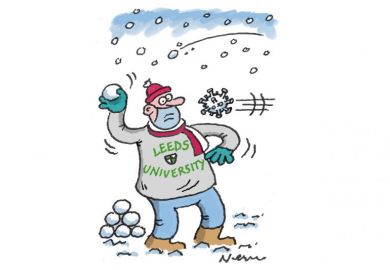
Eyebrows have been raised – or perhaps eyes covered in exasperation – after academics at the University of York took down an online image of the three “see no evil, hear no evil, speak no evil” monkeys because they were worried it could be seen as racist. The Times reported that the organisers of an upcoming art history conference removed the image, which had been used in a call for submissions, because they felt “its iconology promulgates a longstanding visual legacy of oppression and exploits racist stereotypes”. A York spokeswoman said that there had been concern that an image of a monkey could cause offence given that the call included asking for papers representing people of colour. But some scholars of Japanese culture, where the image of the wise monkeys originates, seemed a bit baffled at the decision, while it also gave a free pass to right-wing commentators to launch another “woke” tirade at academia.
An Australian academic made the headlines for an exciting discovery: what appeared to be a pair of designer Manolo Blahnik shoes for a bargain price in a Canberra charity shop. Liz Allen, a demographer at the Australian National University, is usually known for her research on trends in Australian society but caused a flurry of excitement on Twitter for sharing the A$35 (£26) shoes she discovered, which would be worth A$2,125 if they proved to be genuine. However users highlighted that the shoes – which weren’t Dr Allen’s size, and have now been snapped up by a journalist – were unlikely to be genuine Blahniks, The Guardian reported. Dr Allen, who said she was more likely to be found giving lectures and walking shoeless around the university’s corridors, said that she was happy to pass on the opportunity. “In my life, if there’s no use for it, there’s no need to keep it,” she said.
Despite it being launched a couple of months ago, a luxury watch collection containing fragments of Stephen Hawking’s desk caused a bit of a stir on social media after astronomer royal Lord Rees said that he could not think of a “less appropriate way” to commemorate the late Cambridge professor. The timepieces, from watchmaker Bremont, one of which costs £19,000, contain four wooden discs taken from the desk “at which Hawking contemplated the mysteries of the universe” while its serial number is printed on paper used for one of Professor Hawking’s most important research articles on black holes. The company worked with the Hawking family on the watch and some of the proceeds are going to the Stephen Hawking Foundation. Lord Rees, though, expressed his displeasure on Twitter, but perhaps the final word should go to one tweet in reply that pointed out that the price was “astronomical”.
When students and staff take to the streets to protest against university management they may do so more in hope than expectation that it will have an impact. But according to one study in Chile, university rectors may be significantly more likely to step down if they have been the target of demonstrations. The research, published in Higher Education, analysed data on 236 rectors from 60 universities in the country and found that demonstrations against a sitting president reduced their survival time in office by 66 per cent on average. The paper adds that it is “perhaps one of the predictors that has the most substantial impact on survival”, but it is a significant factor only for presidents who have been in office since 2005 because of the coverage of the data before this year.
There is no need to decolonise the curriculum, according to the UK’s business secretary. Calls for universities to rethink the relationship between race and their curricula have been renewed over the past 12 months, and several institutions have said that they will rename buildings which commemorate those who profited from Britain’s empire and the slave trade. However, Kwasi Kwarteng, the first black secretary of state, told the BBC that he was “not someone who is obsessed with trying to correct history” and condemned the removal of statues of slave traders. Calls to “decolonise” the curriculum were not the way forward, he said. “I’m saying the opposite – that you’ve got to learn more about colonialism.” A lot of the debate around “imperialism or colonialism has a very kind of cartoon-like view of what was happening over centuries across a quarter of the world”, he added.
Register to continue
Why register?
- Registration is free and only takes a moment
- Once registered, you can read 3 articles a month
- Sign up for our newsletter
Subscribe
Or subscribe for unlimited access to:
- Unlimited access to news, views, insights & reviews
- Digital editions
- Digital access to THE’s university and college rankings analysis
Already registered or a current subscriber?





